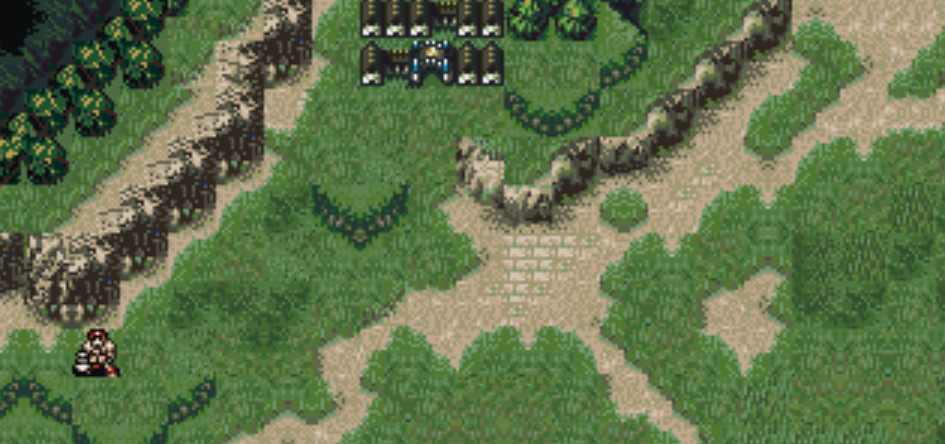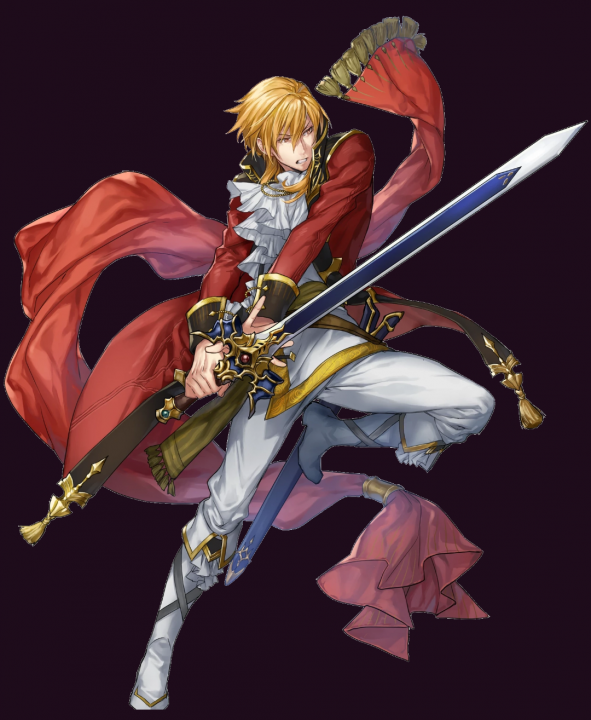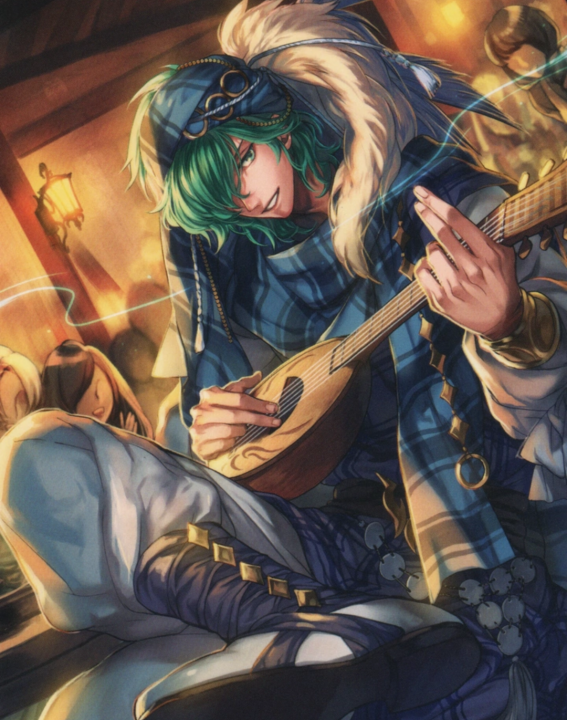Fire Emblem: Seisen no Keifu (Genealogy of the Holy War) is one of the easiest Fire Emblem games to recommend, which makes it baffling that this pivotal turn-based tactics RPG never officially made it to the West. While it is brutally difficult and features all the obsessive grid-counting paranoia ubiquitous to the series, it’s also very slick and modern — many characteristics we know from the Fire Emblem games were first seen here, and these features are as fleshed out here as they are in most of the later works in the series.
The weapons triangle, perhaps the single most defining trait of the Fire Emblem games, made its first appearance in Genealogy of the Holy War, and would remain mostly unchanged until its surprise exclusion in 2019’s Three Houses. The series’ emphasis on character development and relationship building also makes its earliest appearance here, arguably in its most sensible and pure form. Unfortunately, the romance possibilities are limited to hetero options.
Genealogy of the Holy War fares remarkably well in everything new it tries, which is an amazing feat for an entry that introduces so many novel concepts all at once. However, what most impressed me about this game is the way the first half of the plot centers on a protagonist who finds himself compelled to embark on a catastrophic multi-year warpath well outside of his own borders for little more than personal reasons. The story is often critical of its main character, and it’s a tale that beautifully expresses the notion that a stark power disparity, while obviously and most importantly unfair to the common person, can also be vastly unfair to the individual who holds the power, since the consequences of their actions are felt on a much larger scale.
Neglectful Strategists
Sigurd is a noble from Grannvale, a powerful kingdom in the center of the continent of Jugdral that finds itself embroiled in conflicts within and without. The game goes into quite a bit of detail concerning these conflicts, but all we need to know for our purposes is that a city in the desert just outside Grannvale’s northeast border is attacked by warriors from the kingdom of Issach, which lies further still to the northeast. In an all-too-familiar scenario, people in Grannvale are worried about this attack, especially the royals, so the prince leads the combined forces of the kingdom out to contend with the rampaging armies of Issach.
With all of Grannvale’s military eggs foolishly in the Issach basket, Verdane, its apparent allies to the west, grasp at the opportunity to betray them. As they leap past the border in an attempt to seize Grannvale’s westernmost holdings, they find that one of the prince’s most trusted subordinates left his son Sigurd to guard one of these settlements.
Unfortunately for the scoundrels from Verdane, Sigurd is an overpowered Fire Emblem hero. Although the invading expedition makes early progress, even capturing one castle and its steward, Sigurd’s childhood friend Aideen, it is stopped cold by this godlike mounted knight and a few of his buddies. Thus the kingdom is miraculously saved from its own plan. A plan as morally questionable in how it ventured outside of the rulers’ stewardship as it was strategically dismal in how defenseless it left its people.
Just Trying to Help: Conquering Beyond the Borders
It is normal and expected that the protagonists in Fire Emblem games would be masters of the martial arts. This is both a godsend and a potential stumbling block because of the temptation to overuse the character instead of leveling the rest of your crew. However, an additional tension exists in Genealogy of the Holy War: from the beginning, the villages on the map are threatened by looting bandits. This presents stakes beyond the safety and survival of your army, and provides an emergent delivery of the game’s morality message. While it’s true that “bandit” enemies that ravage towns and settlements across the map have shown up in most, if not all of these games, the scenario design in this particular title increases the pressure significantly.
Each mission takes from one to about two hours to complete, dwarfing the time needed to complete almost any other Fire Emblem scenario. This is mostly due to the size of the maps being two to three times the size of any maps in any other Fire Emblem entry. Each scenario seems to represent a year or more of in-game time and a huge swath of the continent. With this in mind, the bandits will often sortie from deep behind enemy lines, meaning that if you wish to reach a town to get the bit of dialogue and gold that comes with its salvation, you may need to risk sending some important and fast units to get there in time. For the first time in a Fire Emblem, I found myself forced to decide whether to leave a town at the mercy of the bandits or risk a character to rescue it. With a heavy heart, I let towns die on a couple of occasions. At other times, I’d resolved to save a town but sent my units too late or allowed them to get intercepted and bogged down, thereby still losing the town. In contrast, when I played the GBA Fire Emblem games, I managed to rescue just about every town with little issue, so this representation of actual wartime hardship and the risk involved in mitigating it was unexpectedly refreshing, if melancholic.

This gameplay wrinkle speaks volumes about the themes this title wrestles with. Namely that the obligations, virtues, evils, and expectations of the holders of power are myriad and conflicting. Powerful leaders open common people up to harm because of personal grievances and ambitions — even our dear hero Sigurd quickly turns a defensive posture into a rampaging subjugation of the continent to satisfy his belief that his own personal feelings are morally justifiable.
As Sigurd liberates his own nation up to the border, he is immediately drawn into his neighbor’s territory to remedy the capture of Aideen. Upon entering Verdane, he learns that an evil sorcerer convinced Verdane’s King to betray Grannvale. Sigurd promises himself that he will only invade to rescue Aideen and then pull back, but then the sympathetic prince of Verdane meets up with Sigurd and asks him to push further in to help the out-of-sorts king. Here is where the snowball of empire is nudged down the hill by the ever-hesitant and regretful Sigurd.
As it unfolds, one of the plot’s greatest strengths emerges: the haphazard organization of each nation. They are surprisingly loose coalitions of powerful houses with the ostensibly affiliated king, dukes, and lords having vastly differing and conflicting intentions and aspirations. Also, in a great detail loosely based on historical modes of government, many of the lords, whether of the same or different nations, have personal relationships with each other even as they conflict with one another.
A Voice for the Unlistened-to.
“…a war now would incur huge sacrifices on both sides! Our past is a testament to that. The noble class aren’t the ones who suffer in the end. It’s the powerless citizens who suffer, and I’m not about to let it happen!”
Lord Eldigan of Agustria
In Agustria, the nation to the northwest of Grannvale, Lord Eldigan, an Agustrian noble and commander of their peerless Cross Knights, cautiously and suspiciously observes the march of destruction carried out by his best friend, Sigurd of Grannvale. Eldigan is the voice of reason during Sigurd’s forays into Verdane and Agustria. Of course he has to be the one that Sigurd listens to, since they are social equals, but Eldigan is an adequate advocate for the common people and foil to Sigurd’s constant military advances.

Sigurd understands his folly intellectually, but he constantly justifies himself to Eldigan, who readily gives Sigurd the benefit of the doubt. Not long into the Verdane campaign, Eldigan’s countryman, a commander named Elliot, notices the chaos and tries to invade Verdane from the North. Upon realizing this, Eldigan deploys his cross knights and obliterates Elliot’s forces. Soon after, he tries to convince his king to cease a military buildup for a campaign against Grannvale. For this “treason,” and undoubtedly partly for his intervention against Elliott’s attempted invasion, he is captured and imprisoned by his superiors. Obviously Sigurd must now (you guessed it) invade Agustria preemptively to cripple its mobilization and rescue his friend. He justifies this to Eldigan’s sister thusly:
“Of course. I’ve no fondness for bringing war to foreign lands, but in this case we’ve little choice. His Majesty, […] has already approved military action. His Majesty also believes Eldigan’s rescue to be vital if we’re to put an end to hostilities. Rest assured, Lachesis. I swear that I’ll save Eldigan…”
Sigurd, Holy Knight of Grannvale to Princess Lachesis, sister of Eldigan
The Mercurial Prince
Eldigan’s criticism of Sigurd is the most front-and-center, but during the rescue mission in Agustria, we meet Lewyn, the Prince of a nation called Silesia. He has escaped from his kingdom and is wandering Agustria as a vagabond bard. Delightfully, when Sigurd meets him, the first thing Lewyn does is berate the young noble for having the audacity to continue his campaign up to that point. In a bizarre response, Sigurd begins to apologize and promise he’ll abandon the campaign immediately. Lewyn then laughs and decides he likes Sigurd’s chutzpa and joins his party.
This may seem wildly incongruous, but one may also view this brief dialogue as an expression of the terrifying reality that the capricious whims of the powerful few lead to decisions that affect the many. Prince Lewyn frankly should not lead a nation with that recklessly unpredictable will of his. Pivoting to the arts was the right idea.
“Ahahaha! Y’know, I guess I was wrong about you. You’re alright, Sigurd. Say, why don’t I help you finish this fight up?”
Lewyn, incognito prince of Silesia, wasn’t wrong about Sigurd

Conflicting Loyalties
The king of Agustria subsequently falls to Sigurd in battle. At the last minute, Eldigan rescues him, loyal to his liege even after his harsh treatment of him. By doing this, he naturally gains a pardon. A year or so later, as Sigurd remains in Agustria, the people’s complaints of the occupation can no longer be ignored. Eldigan is ordered by his now recuperated king to root Sigurd’s occupying force out of Agustria.
Eldigan doesn’t want to fight Sigurd, but he’s clearly fed up. His loyalties lie with his Sovereign, and there are very obvious crimes being committed against his country. He draws his sword in its defense sadly, but without hesitation. It is possible to kill Eldigan in this battle, but if you have his sister in your crew, she will convince him to break off and attempt to convince his superior to back down. It doesn’t work. Either way ends in Eldigan’s death.
Imagine the predicament: at first you’re fending off a foreign invasion, then a few years later you’ve marauded across half the continent, trampling independently governed nations until they act how you want them to act. Finally, you find yourself occupying a foreign land for years under orders of your king, ultimately causing the death of your best friend at a time when your supply of allies is rapidly diminishing. This is personal and political whiplash. To make matters worse, an army from Grannvale arrives to apprehend Sigurd. To his surprise, he’s been branded a traitor thanks to the political ambitions and machinations of his countrymen. Luckily for him, he has that little shit Lewyn hanging around, because Silesian agents find out where he is and who he’s with and come to pull not only Lewyn, but all of Sigurd’s crew out of Agustria.
The army subsequently finds Sigurd in Silesia, so he decides to spare the kingdom by running home, apparently to confront his accusers and clear his name. Eventually he is tricked, ambushed, and murdered. His blind obedience, lack of discipline, and naivety are what kill him. Figuratively at least. What literally killed him was a magically invoked meteor barrage cast by the head of the Grannvale Royal Guard. This same man was responsible for the kidnapping of Sigurd’s wife.
Those Who Inherit Consequence
Genealogy of the Holy War goes to some length to put at the front of the player’s mind the worldview that the only drama, strife, and struggle that matters to the powerful classes are those of the powerful classes. Sigurd, the man the player embodies, belongs in that group, so the player is inclined to sympathize with him despite his natural disconnection from common people. In the text, the game occasionally lobs critiques toward him and others like him through Eldigan, Lewyn, and perhaps some dialogue with villagers. However, whether or not articulating this critique is a main objective of this game is hard to tell. The prudent reading seems to be that ultimately this is a typical good versus evil story. You’re likely meant to remain sympathetic to Sigurd and his entourage, as the game goes out of it’s way to make your enemies seem nasty, while the Holy Knight of Grannvale remains a nice boy throughout. Even with this generous reading of Sigurd as a character, the game correctly contends that the idea that regime change is justifiable because the leaders are “bad” and your side is “good” comes with serious baggage.
A slightly more adventurous, and perhaps more satisfying reading that’s still present in the text is that the first half of this game is purely about Sigurd’s deadly folly. It tells the tale of a rapidly spiraling commander who burned bridges, deposed rulers, got his friend killed and spouse kidnapped, and opened himself up to betrayal, humiliation, and ultimately, assassination. It is unusual and useful that this interpretation could exist at all in a work where the center of our emotional attention is on this character.
Lest we seem totally unsympathetic, it is fair to note that personal loyalty is a virtue many seek, and Sigurd does embody this virtue even at great personal sacrifice. Sigurd’s attempts to do right by his colleagues and friends cause him to go far away from his home for many years. His consideration of an apparent enemy prince’s plight causes him to further extend himself into foreign territory and helps kick off a military campaign, albeit one he never wanted. His attempt to fulfill duty to his nation also caused his wife to be captured by an official of his own government, leaving him essentially a single father to an infant son.
This, along with Sigurd’s assassination, sets the stage for the second half of the game, which lies outside of the scope of this writing. As the subtitle suggests, this is a game about a generation seeking to right the wrongs of the world and perhaps the earlier generation. It’s a neat mechanic, with children who inherit the traits of their parents depending on who paired up with who in the previous part of the game, but suffice it for us to say that this correction sought by the progeny of Sigurd’s comrades may not have been necessary if Sigurd had demonstrated restraint and discipline from the beginning. The political and civic possibilities could have been much broader than those that were left to the next generation, one which is also doomed to pass through the horrors of war.



